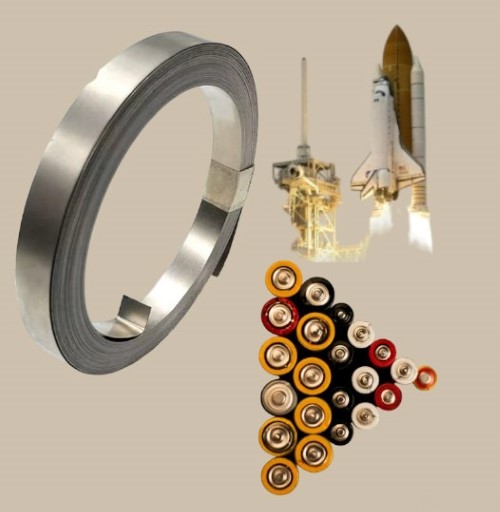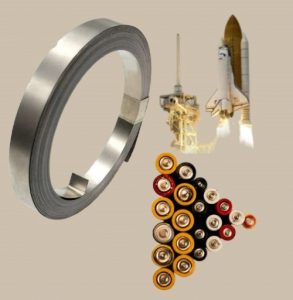Nickel Foil: Types, Benefits, and Uses

Introduction
Nickel foil, a thin sheet of nickel metal, is renowned for its exceptional mechanical properties, corrosion resistance, and versatility in various applications. This article will discuss the different types of nickel foil, their benefits, and the myriad of uses across multiple industries, highlighting why nickel foil is a material of choice in many high-tech and industrial sectors.

Types of Nickel Foil
Nickel foil is a versatile material used across various industries. Here are several common types, each with specific characteristics and suited for particular uses.
- Pure Nickel Foil: Composed of nearly 100% nickel, pure Ni foil offers excellent corrosion resistance, especially in alkaline and acidic environments. Its high electrical conductivity and magnetic properties make it suitable for applications requiring these characteristics.
- Nickel Alloy Foil: These foils contain a mixture of nickel and other metals such as chromium, iron, and copper. The addition of other elements enhances certain properties of the foil, such as increased strength, improved corrosion resistance, and better thermal stability. Common nickel alloys include Nichrome (nickel-chromium) and Monel (nickel-copper).
- Electrolytic Nickel Foil: Produced through electroplating processes, electrolytic Ni foil features a high purity level and uniform thickness. This type is often used in applications where precise dimensions and surface finish are critical.
- Rolled Nickel Foil: Manufactured by rolling nickel billets into thin sheets, rolled Ni foil offers excellent mechanical properties and is widely used in high-temperature and high-stress applications.
Benefits of Nickel Foil
Nickel foil offers numerous advantages, including excellent conductivity, durability, and resistance to harsh environments. Below, we explore the key benefits.
- Corrosion Resistance: This foil exhibits outstanding resistance to corrosion, making it suitable for use in harsh environments where exposure to chemicals, acids, and alkaline solutions is common. This property ensures longevity and reliability in demanding applications.
- High Melting Point: With a melting point of 1455°C (2651°F), it can withstand high temperatures without losing its structural integrity. This makes it ideal for applications involving extreme heat.
- Electrical Conductivity: Nickel is a good conductor of electricity, which is beneficial in electronic applications. Ni foil's conductivity ensures efficient energy transfer in electrical devices and components.
- Magnetic Properties: Nickel's ferromagnetic nature allows its foil to be magnetized and attracted to a magnet. This property is valuable in applications involving magnetic fields and devices.
- Mechanical Strength: Despite its thinness, nickel foil maintains excellent mechanical strength and durability, ensuring it can withstand physical stress and strain in various applications.
- Ductility and Malleability: Its ductility and malleability allow it to be easily shaped and formed into various configurations without cracking or breaking. This versatility is essential in manufacturing processes requiring precise and intricate designs.
- Recyclability: Nickel foil is environmentally friendly due to its recyclability. Used ones can be recovered and repurposed, reducing waste and contributing to sustainable practices.
Uses of Nickel Foil
Ni foil finds applications in a wide range of industries due to its unique properties. Here are some primary uses across different sectors.
- Electronics: This foil is extensively used in the electronics industry for manufacturing batteries, capacitors, and other electronic components. Its excellent electrical conductivity and resistance to corrosion enhance the performance and lifespan of electronic devices. For instance, it is a critical component in lithium-ion batteries, where it serves as a current collector and contributes to efficient energy storage.
- Aerospace: In the aerospace industry, Ni foil is utilized for its high strength-to-weight ratio and resistance to extreme temperatures. It is often employed in turbine blades, engine components, and other critical parts that require reliable performance under harsh conditions. Its ability to withstand high stress and temperature variations makes it indispensable in aerospace engineering.
- Energy Storage: Nickel foil plays a crucial role in the production of energy storage devices, including batteries and capacitors. Its ability to conduct electricity efficiently and resist corrosion helps improve battery efficiency and lifespan. In fuel cells, it acts as an electrode material, facilitating electrochemical reactions and enhancing overall performance.
- Medical Devices: The biocompatibility and corrosion resistance make it suitable for medical applications, such as implants, surgical instruments, and diagnostic equipment. Nickel foil's reliability ensures that medical devices function correctly and safely over extended periods.
- Automotive: In the automotive industry, such foil is used in various components, including sensors, actuators, and fuel cells. Its durability and resistance to wear and tear ensure reliable performance in vehicles. Its application in fuel cells, for example, helps improve the efficiency and sustainability of hydrogen-powered vehicles.
- Hydrogen Production: Nickel foil is used in electrolyzers for hydrogen production, benefiting from its catalytic properties and ability to withstand the corrosive environment within the electrolyzer. This application is crucial for developing sustainable energy solutions and reducing carbon emissions.
- Packaging and Shielding: Its excellent barrier properties make it suitable for packaging sensitive electronic components and providing electromagnetic shielding in various devices. Its ability to block electromagnetic interference (EMI) ensures the proper functioning of electronic equipment.
Conclusion
Nickel foil is a versatile and valuable material that offers a wide range of benefits, including corrosion resistance, high melting point, electrical conductivity, and mechanical strength. These properties make nickel foil indispensable in various industries, from electronics and aerospace to energy storage and medical devices.
As technology advances and the demand for high-performance materials grows, nickel foil will drive innovation and ensure the reliability and efficiency of modern applications. Advanced Refractory Metals (ARM) is a premier supplier of nickel products. We also provide customized materials tailored to your specific requirements and drawings. Send us an inquiry if you are interested.
{{item.content}}
LEVE A REPLY
{{item.children[0].content}}
{{item.content}}






